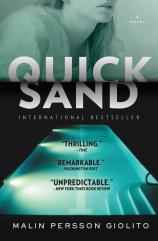Interview: March 9, 2017
Malin Persson Giolito has worked as a lawyer for the biggest law firm in the Nordic region and as an official for the European Commission in Brussels, Belgium. She is now a full-time writer and has written four novels. In QUICKSAND, her English debut, she tackles themes of class, money and violence. When a mass shooting takes place at a Stockholm prep school, 18-year-old Maja Norberg is put on trial for her role in the massacre. In this interview conducted by Carol Fitzgerald, the president and co-founder of The Book Report Network, Persson Giolito discusses the challenges of writing QUICKSAND --- including developing the character of Maja and piecing the story together --- her decision to set the novel in an affluent place, and why she personally doesn't classify her work as "thrillers" per se.
Bookreporter.com: Your character Maja is wonderfully written; she’s both a multi-dimensional protagonist and a brilliantly unreliable narrator. Readers see so many “faces of her” as her story unfolds. At times she is wise beyond her years, at others woefully lost, and still at others childlike. What drew you to write this character? Was there one aspect of Maja that was easier for you to write? And one more challenging?
Malin Persson Giolito: Thank you. I think that the big challenge was to let Maja develop, to make her into all of that you are talking about. She is a child, a woman, angry, loving, inexperienced, and yet she has gone through more than most people do in a lifetime. I think that the most challenging part was her relationship with Sebastian and the love that she has for him. She is so dependent on him still and that makes her react in ways that you don’t necessarily want her to. And I care for Maja, so much that it hurts. The easiest part was her anger. I so related to her rage. And I loved her judgmental honesty, that she doesn’t give a damn what people think of her, or rather, that she thinks that she doesn’t. It was a wonderful part of the writing.
BRC: Maja holds all the cards, while the adults work to gain the upper hand. They struggle to get from her the story of what happened in the school. They boast that they can save her, but only if she cooperates. There is a real push/pull of authority and captor, of truth versus presumption. Was the plotting that went into the story that built this tension all drawn in advance, or did it unfold as you wrote?
MPG: The putting-together of the novel was a huge challenge. This is not a book that was written in a flow; every bit of it has taken much time and effort. I knew what I was after (for instance, to make it feel as if Maja tells the story in just one honest flow), but I had to write in order to unfold it, and re-write and re-write until I got there. The book is not written in the order it is composed. Much of my own work (long before it became a final draft) has been to look at all the pieces I had written and then put them together in a way that made the story unfold just “right.” For instance, I wrote the story about the year before the school shooting --- more or less --- like one separate novel before I started to chop it up in bits and pieces and place it in the novel. I also wrote the days after the school shooting (the ambulance scene, hospital, jail, interrogation, etc.) more or less as a single story, as well as the court procedure. So, for me, it started as at least three different novels. But then, I also had to write large sections on the different key characters of the novel in order to get to know them (I think when I write, it is as if I don’t know what I want until I have written it down). For instance, I wrote more than a hundred pages from the perspective of Sander, Maja’s lawyer --- that never made it into the novel --- just to get to know him properly.
BRC: There are moments when Maja realizes that she is in over her head, but she cannot get out from under and she soldiers on, especially as the story crescendos. She also is letting a boy shape her until she sees how damaged he is, and then it is too late. Was there a bit of social commentary on teen girls and their often unhealthy relationships with the boys they care about, besides Maja’s other misguided judgment?
MPG: Well, the fact that she is an inexperienced teenager (who lives in a protected, privileged, isolated environment) is of course an important factor. But she is also a quite typical victim of co-dependence. I believe Maja has much in common with the typical “battered wife.” I am not sure I wanted to make a commentary about this, but as a mother I am terrified that I wouldn’t detect if one of my daughters ended up in an abusive relationship. Because you want to protect the ones you love, although at the same time, you just want them to be happy. And sometimes you have a tendency to look away from the things that you don’t want to see, even as a mother. I have an inclination to write about the things that frighten me. And I am afraid that I will let my daughters down. I am more afraid of that than of anything else.
BRC: Wealth factors prominently into the story. What wealth buys and what it cannot were big themes for me. Can you talk to us about why you chose to set the story in an affluent place?
MPG: If we start with the larger picture --- in society today, there is no political issue more important than the growing gap between the richest and the poorest. Oxfam published their most recent report just a month ago, and it pointed out that the eight richest men in the world own as much as the poorest half of the world population. This is catastrophic. It will lead to revolution and will not be pretty. But we hardly talk about it. That amazes me. And, yes, it frightens me a great deal. And, as I said, I write about the things that scare me.
Crime literature does not always have to be about murder, but it always has to be about conflict. And this --- the conflict between rich and poor and what it does to us, on a personal as well as a structural level --- is the most important conflict in our society today. I wanted to tell a story about that.
Which brings us to the smaller picture. The classroom. A few kids, a teacher, representatives from all parts of society gathered in a small room. And it has ended in total disaster. Why? The poorest kid in this classroom has a lot in common with the richest kid. One became the first victim; the other one is the perpetrator. What has the poorest tried to buy? What did the fortune of the richest bring?
But on a purely individual level, why did I choose the perspective of the rich? Because that is the part of society I know. I grew up in the most affluent community in Sweden, I belong to the most privileged part of western society.
BRC: Did you always know how the book was going to end, or did you come to that as you were writing?
MPG: Yes and no. There were parts of the ending that I knew from the beginning. I can’t tell you which ones, for spoiler reasons obviously. But there were parts that didn’t fall into place until the very end. Parts that now seem so obvious.
BRC: Sadly, since Columbine back in 1999, school shootings have occurred with dizzying frequency in the United States, so much so that many do not make the national news. Is the same violence present in schools in Sweden, or Brussels where you now live?
MPG: No, the situation in Europe is not comparable to the US. There is violence in schools all over the world, obviously, but we have been more spared of that extreme form. Why, I couldn’t tell you. In Sweden, there has never been a “proper” school shooting. However, in 1961 there was a fatal shooting, resulting in one casualty, at a school dance in Kungälv outside Gothenburg, and in 2015 there was a sword attack in a school in Trollhättan where four people, including the perpetrator, died.
BRC: Meeting you in Minneapolis in January, I noted you were very comfortable speaking in English, but you write in Swedish. Do you feel that you can write more strongly in your native tongue?
MPG: Oh yes. Believe me, I would not feel comfortable writing novels in English. It is uncomfortable enough in my mother tongue.
BRC: You received the prestigious Best Swedish Crime Novel of the Year Award, which is impressive in a country known for its crime writers. What was that experience like?
MPG: A very pleasant experience. I didn’t think they would give me the award, since it is not a typical crime novel, but it made me very happy that they did.
BRC: What American and international crime writers do you enjoy reading?
MPG: Gillian Flynn, John Grisham, Dennis Lehane, Ruth Rendell, Philippe Claudel, Tana French, Ferdinand von Schirach, to mention a few. And Margret Atwood, of course (yes, she writes crime as well…)
BRC: You did not always write suspense/thrillers. What drove you to delve into this genre?
MPG: To be honest, I am not sure I am writing thrillers. Don’t tell my publishers, but I would never call my books thrillers. But I do tell stories about crime and the pursuit of justice, and I hope I do it in a way that makes the books impossible to put down, just like a good thriller should. All of the books that I have written deal with lawyers and justice, even the one that wasn’t classified as crime. To that extent, my writing hasn’t changed. I want to write suspenseful novels that are easy to read and difficult to write. Apart from that, I don’t plan. I let my publishers deal with labelling.
BRC: Is there a plan for more of your work to be published in the States? And what are you working on now?
MPG: My third book, BEYOND ANY REASONABLE DOUBT, will hopefully be coming out in the US next year. And to the extent that lying on my couch, staring into the void, thinking of The Great European Novel counts as working, I am now working on The Great European Novel.




